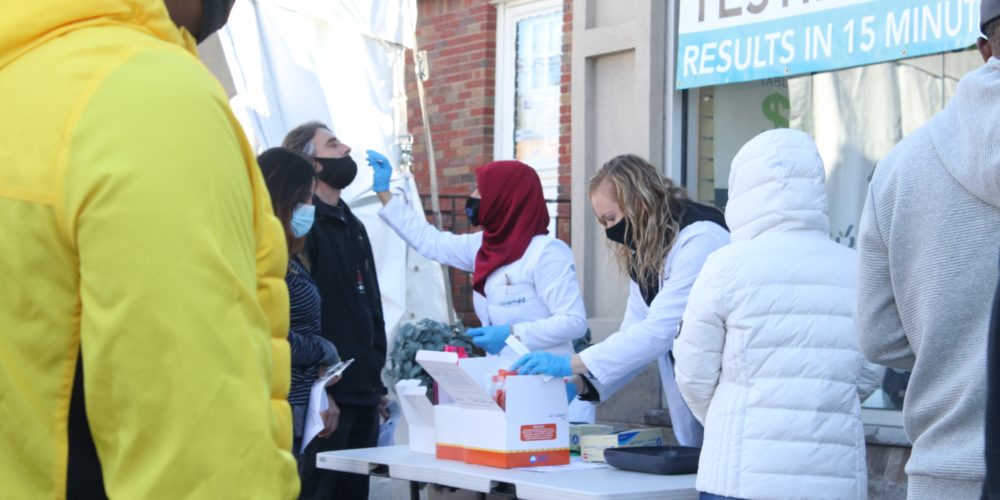
COVID-19 Antigen Testing for Asymptomatic and Symptomatic People
Despite significant and positive progress, the COVID-19 pandemic is far from over. Therefore, implementing and distributing accurate and timely testing remains imperative when it comes to stopping the spread of the COVID-19 virus and its variants. All forms of COVID-19 testing are vital to halting and preventing viral outbreaks. But how do these tests work and how are you meant to understand the results? As a part of our ongoing blog series, we’re continuing to go through the basics of COVID-19 testing. This blog will specifically focus on COVID-19 antigen tests and how they work in both asymptomatic and symptomatic individuals.
For a more in-depth look at COVID-19 testing processes, read through our previous blog post.
What is antigen testing?
Antigen tests detect protein fragments specific to the coronavirus, instead of detecting viral genetic material. The antigen test result time is rapid and may be reviewed as soon as an hour after the sample has been collected. Antigen tests may also be self administered at home.
What is the difference between a COVID-19 antigen test and a PCR test?
PCR tests and antigen tests are similar in that they both can be used to detect covid in symptomatic and asymptomatic people and are conducted using a nasal swab. However, PCR tests are designed to detect the COVID-19 virus’ genetic material (viral RNA). This makes the results from PCR tests slightly more accurate when compared to antigen tests. The drawback is that PCR test results take slightly longer to process. PCR tests can take anywhere from three to seven days to process, depending on the volume of test results the lab has received.
But which type of COVID-19 test is more reliable?
A PCR test is considered to be the “gold standard” of covid testing and is significantly more reliable than an antigen test. Antigen tests often produce false positives or false negatives. Therefore, you should always pursue a PCR test if possible. However, if you need results quickly and do not have easy access to a PCR test then a rapid antigen test is also acceptable.
What does a negative COVID-19 antigen test result mean in asymptomatic persons?
If you are asymptomatic for COVID-19 and receive a negative result from your antigen test, then it is reasonable to assume that you are not currently infected with the COVID-19 virus. However, this guidance varies depending on your specific situation. For example, if you receive a negative result from your antigen test and are asymptomatic you may need additional testing if you have knowingly been directly exposed to a person who has tested positive for COVID-19 within the last 14 days. In addition, the CDC recommends that if you have been directly exposed to a person who has tested positive for COVID-19 in the past 14 days then you should follow the CDC’s guidelines for self-isolation.
What if you are vaccinated?
If you have not knowingly been exposed to someone who has tested positive for COVID-19, have been vaccinated, and are asymptomatic then you may need to pursue additional COVID-19 testing after receiving a negative antigen test result. However, if you are unvaccinated and have knowingly been exposed to someone who has tested positive for COVID-19 then you should pursue a PCR COVID-19 test as soon as possible.
What should be done if your COVID-19 antigen test result is positive?
For symptomatic individuals
If you are symptomatic and receive a positive result from your antigen test, then this indicates that you are likely infected with COVID-19 and you should follow the CDC guidelines for isolation.
If you are symptomatic and receive a negative test result then there are a few steps you should follow depending on your situation. For example, if you have been knowingly exposed to someone who has tested positive for COVID-19 within the past 14 days or if you are unvaccinated then you should take an additional PCR COVID-19 test to confirm your antigen testing results. If you are fully vaccinated and received a positive antigen test result then you should pursue additional PCR testing as well.
For asymptomatic individuals
If you are asymptomatic and receive a positive result from your antigen test, then this indicates that you are likely infected with COVID-19 and you should follow the CDC guidelines for isolation.
However, if you are fully vaccinated or have not knowingly been exposed to COVID-19 within the past 14 days then you may pursue additional PCR testing to confirm your results.
Check out the CDC’s helpful antigen testing results chart that provides visual examples of these guidelines.
Take the next step with BioCollections
Although PCR tests provide more accurate results, you should still pursue an antigen test if a PCR test is not easy for you to access. The most important thing is that you are getting tested if you believe you have been exposed to COVID-19. Whether you are asymptomatic or symptomatic, be sure to follow all of the CDC guidelines to help keep yourself and others safe.
If you are interested in getting a COVID-19 test, BioCollections provides quick, safe, and reliable testing solutions to help put your mind at ease. We offer an accelerated turn-around with our PCR covid tests and can deliver your results within eleven to thirteen hours. Feel free to contact us with additional questions, or if you need help connecting with any of our US based or international testing locations.
